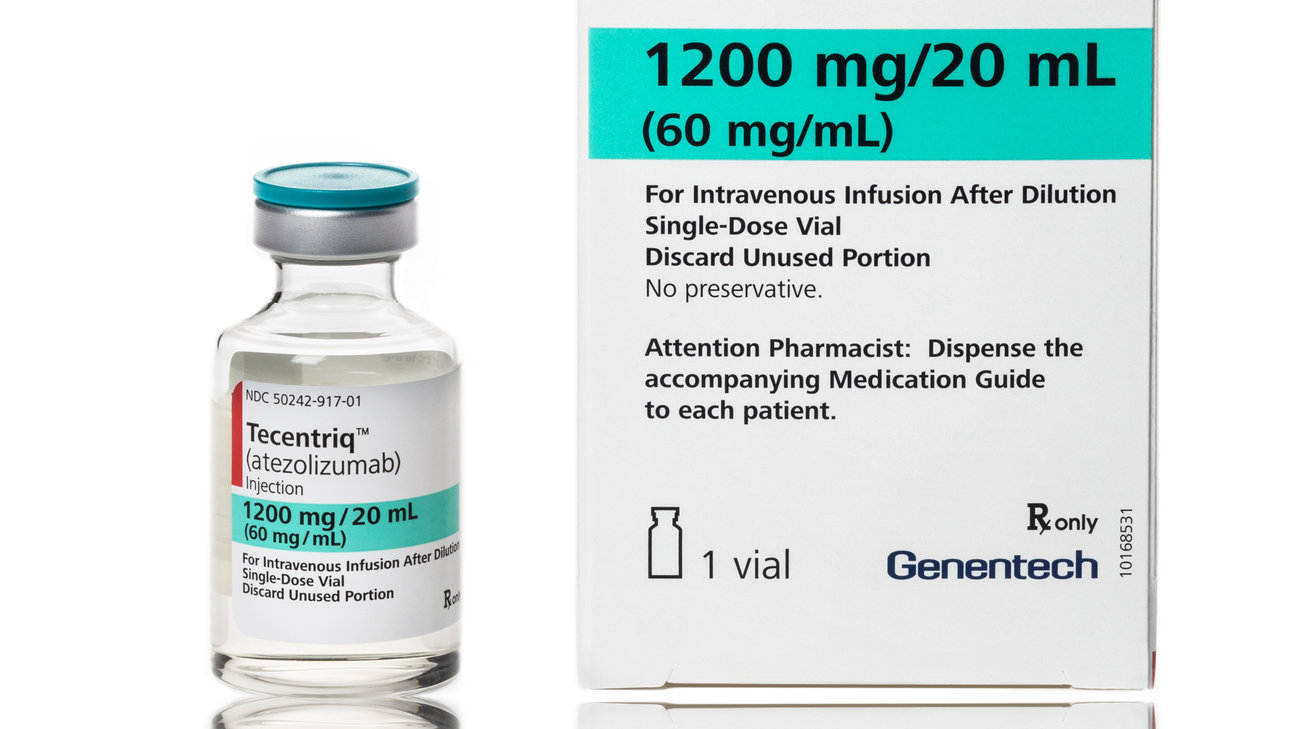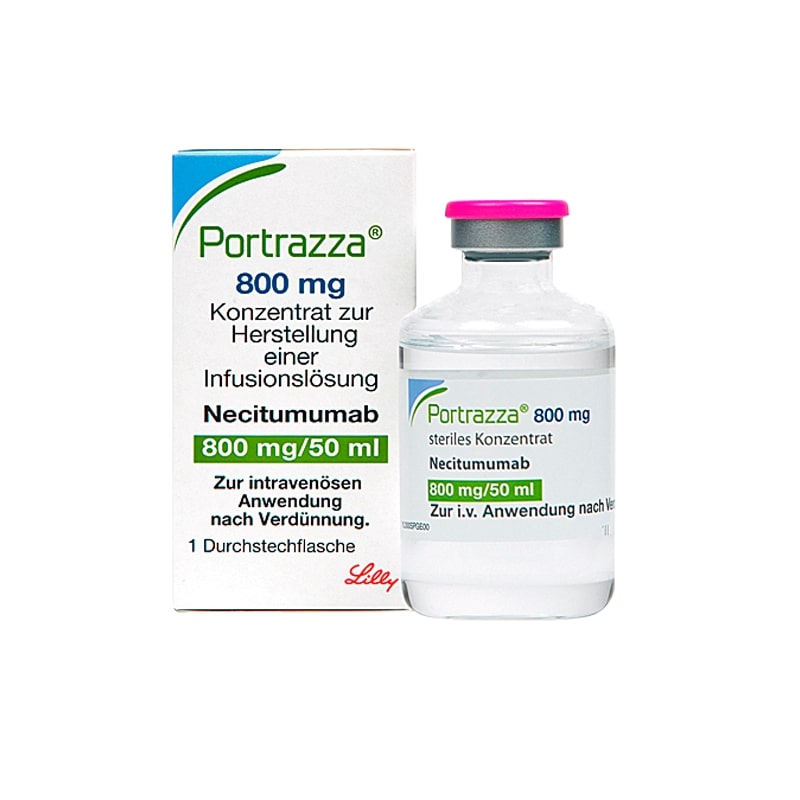Tecentriq (Atezolizumab) vs Portrazza (necitumumab)
Tecentriq (Atezolizumab) vs Portrazza (necitumumab)
Tecentriq (atezolizumab) is an immune checkpoint inhibitor that works by blocking the PD-L1 protein, thereby enhancing the body's immune response against cancer cells, and is used for various types of cancer, including non-small cell lung cancer (NSCLC), small cell lung cancer (SCLC), and others. Portrazza (necitumumab) is a monoclonal antibody that targets the EGFR protein and is specifically approved for use in combination with chemotherapy for the treatment of metastatic squamous NSCLC. When deciding between Tecentriq and Portrazza, it is crucial to consider the specific type and characteristics of the lung cancer, previous treatments, and the patient's overall health, as these factors will influence the effectiveness and suitability of the medicine for their condition.
Difference between Tecentriq and Portrazza
| Metric | Tecentriq (Atezolizumab) | Portrazza (necitumumab) |
|---|---|---|
| Generic name | Atezolizumab | Necitumumab |
| Indications | Urothelial carcinoma, non-small cell lung cancer, triple-negative breast cancer, hepatocellular carcinoma, and others | Squamous non-small cell lung cancer |
| Mechanism of action | PD-L1 inhibitor, which blocks the interaction between PD-L1 and its receptors PD-1 and B7.1 | EGFR antagonist, which binds to the epidermal growth factor receptor |
| Brand names | Tecentriq | Portrazza |
| Administrative route | Intravenous infusion | Intravenous infusion |
| Side effects | Fatigue, decreased appetite, nausea, urinary tract infections, fever, and others | Rash, magnesium depletion, venous thromboembolism, dermatitis acneiform, and others |
| Contraindications | History of severe hypersensitivity to atezolizumab or any of its excipients | History of severe hypersensitivity to necitumumab or any of its components |
| Drug class | Monoclonal antibody, Immune checkpoint inhibitor | Monoclonal antibody, EGFR inhibitor |
| Manufacturer | Genentech (Roche) | Eli Lilly and Company |
Efficacy
Efficacy of Tecentriq (Atezolizumab) in Lung Cancer
Tecentriq (Atezolizumab) is an immune checkpoint inhibitor specifically designed to target and bind to the PD-L1 protein, which is expressed on tumor cells and tumor-infiltrating immune cells. This binding inhibits the interactions between PD-L1 and its receptors, PD-1 and B7.1, which can enhance the T-cell response against tumor cells. Atezolizumab has shown efficacy in the treatment of non-small cell lung cancer (NSCLC). In clinical trials, Tecentriq has been shown to improve survival in patients with NSCLC, particularly in those who have high PD-L1 expression on their tumor cells or on tumor-infiltrating immune cells. The improvement in overall survival and progression-free survival has led to the approval of Tecentriq for the treatment of patients with metastatic NSCLC who have disease progression during or following platinum-containing chemotherapy, and have progressed on an appropriate FDA-approved targeted therapy if their tumor has EGFR or ALK gene abnormalities.
Efficacy of Portrazza (Necitumumab) in Lung Cancer
Portrazza (Necitumumab) is a recombinant human IgG1 monoclonal antibody that binds to the human epidermal growth factor receptor (EGFR), expressed on the surface of both normal and cancer cells. In lung cancer, EGFR is often overexpressed, which can contribute to the growth and proliferation of tumor cells. Portrazza has been approved for use in combination with gemcitabine and cisplatin for first-line treatment of patients with metastatic squamous non-small cell lung cancer (NSCLC). Clinical trials have demonstrated that adding necitumumab to chemotherapy improved overall survival compared to chemotherapy alone in patients with advanced squamous NSCLC. However, it is important to note that Portrazza is not indicated for the treatment of patients with non-squamous NSCLC.
Both Tecentriq and Portrazza represent advancements in the treatment of lung cancer, offering new options for patients with specific types of NSCLC. The efficacy of these drugs is dependent on various factors, including the molecular characteristics of the tumor, the line of therapy, and the overall health of the patient. As with all cancer treatments, the use of Tecentriq and Portrazza should be individualized based on a thorough evaluation of the potential benefits and risks for each patient.
It is also important to note that ongoing research may provide further insights into the efficacy of these drugs, potentially expanding their use in lung cancer treatment. Physicians must stay informed about the latest clinical trial data and treatment guidelines to make the best therapeutic decisions for their patients with lung cancer.
Regulatory Agency Approvals
Tecentriq
-
European Medical Agency (EMA), European Union

-
Food and Drug Administration (FDA), USA

-
Health Canada

-
Pharmaceuticals and Medical Devices Agency (PMDA), Japan

-
Therapeutic Goods Administration (TGA), Australia

-
Medsafe (NZ)

Portrazza
-
European Medical Agency (EMA), European Union

-
Food and Drug Administration (FDA), USA

-
Health Canada

Access Tecentriq or Portrazza today
If Tecentriq or Portrazza are not approved or available in your country (e.g. due to supply issues), you can access them via Everyone.org.
How it works

Make an enquiry
Choose the medicine you want to buy, answer a couple of questions, and upload your prescription to speed things up. We’ll get back to you within 24 hours.


Make an enquiry
Choose the medicine you want to buy, answer a couple of questions, and upload your prescription to speed things up. We’ll get back to you within 24 hours.


Breeze through the paperwork
We'll guide you through the required documents for importing unapproved medicine, ensuring you have all the necessary information.


Get a personalized quote
We’ll prepare a quote for you, including medicine costs and any shipping, administrative, or import fees that may apply.


Receive your medicine
Accept the quote and we’ll handle the rest - sourcing and safely delivering your medicine.

Some text on this page has been automatically generated. Speak to your physician before you start a new treatment or medication.
Let's talk
If you have any questions, call us or send us a message through WhatsApp or email:
Contact us




